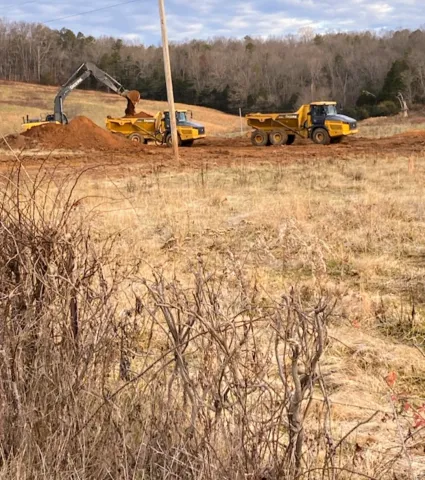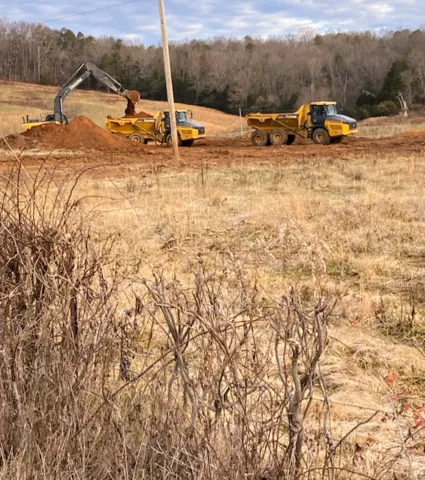Sharps Chapel hatchery opponents ‘on to something’

Breaking ground for the Pharmeceutical Hatchery in Sharps Chapel
has begun. Photo Credit: NLPA
by Helina Bailey
Chances are, you’ve heard about people in Sharps Chapel who are worried about having to smell manure. I certainly have heard of them, and being that this is rural Tennessee, home to beautiful cattle farms and the like, I have no sympathy for them.
I grew up in agriculture and my home was an arm's reach from a dairy farm when I lived in Japan. The hot, humid summers of Nagasaki make East Tennessee’s summers seem mild. My neighbor, an older woman who grew up on a large farm in the Midwest, would stand outside with her hands on her hips taking deep breaths of the hot manure filled air. “Don’t you just love it?”
I would laugh, “we must be crazy, because I do!”
I associate the smell of farms with freedom, conjuring up images of wide-open spaces and my grandpa hollering at us kids to get out of his corn field. I’m not entirely sure why, but it fills me with a sense of peace and hope for the future, unless it’s a rotting cabbage field. Although, at this stage in life, I might be like my neighbor and take a deep breath for nostalgia’s sake and imagine I’m a kid again.
Despite my own personal feelings surrounding agriculture, believing that it is the backbone of a healthy economy and should be preserved at all costs, I wondered if there was any merit to the complaints after a story aired on the Channel 10 news in mid-January.
Multiple outlets have covered the opening of the Mexico-based pharmaceutical hatchery and highlighted the concerns of locals. Owner of Alpes Sanfer, Jose Aviles, stated that he “does not understand the opposition” to the huge project that is currently underway and set to be completed in the summer.
This facility is expected to bring 30 jobs to the area, as well as 72, 000 laying hens which will be providing eggs for domestic vaccine manufacturing.
A company representative delivered some linguistic gymnastics during his interview with Channel 10 when explaining how they do have oversight in the form of pharmaceutical audits and protocols. These, however, do not address the concerns of locals who fear the lack of oversight and regulations in regard to the environmental impact on the air quality, water quality and the local wildlife.
The Alpes Sanfer representative acknowledged that local agencies such as the FDA will only step in once an issue arises. In short, preventative measures are not mandatory, and only once environmental damage has occurred can local agencies be called in.
Knowing that, the opposition seems to go beyond that of people just worried about smelling manure. The preservation of Norris Lake is not a Sharps Chapel issue, it effects the entire region. Despite this being the most obvious, the list of concerns is quite extensive once you peer past the surface and see the lack of transparency provided by Alpes Sanfer.
The jobs they are bringing to the community have not been promised to locals, and actually seem to alienate Union County folks due to the long list of employee restrictions which include no hunting of fowl, no coming into contact with properties housing poultry, no eating of eggs, etc. These restrictions are necessary precautions due to the nature of the facility, but most folk in these parts have family or friends who raise chickens.
In addition to the employee restrictions, the sheer volume of manure that will be produced each day is concerning when it comes to how it will be disposed of and the additional strain trucking it out will put on our roads.
The facility has shared their plan to give free manure to local farmers, but at 6,000-10,000 pounds of manure a day, how will this be facilitated? If this amount can cover up to five acres, and local cattle farmers only fertilize once or twice a year, will this plan be sufficient long term? Are the farmers signed up to ensure that the manure will be swiftly moved from the facility and not piling up near the lake or blowing downwind to the local elementary school?
Furthermore, since the facility will not be engaging in local commerce, how will it benefit the local economy outside of the contract with the local trucking company? If the small residential roads into Sharps Chapel cannot accommodate the extra traffic, who will pay for the repairs?
Each question begets another, and it has become painfully clear that the people complaining about the facility are on to something.
The forming of the non-profit Norris Lake Protection Alliance (NLPA) makes sense after discovering the troubling truth and lack of transparency that is going on in our own backyard. Hopefully, with more concerned citizens involved, this huge enterprise will feel compelled to build a relationship with the community and not dismiss the “opposition” as unjustified.
If you would like to become involved with encouraging Alpes Sanfer to be accountable and transparent, NLPA is always looking for volunteers. They are also seeking donations and corporate sponsors to put towards water testing of Norris Lake. It should be noted that TVA tests water quality on a revolving schedule that can be five years apart, at which point damage could be irreversible. The NLPA has recently partnered with Socially Responsible Agriculture Project (SRAP) in Delaware, an organization that “provides communities with the knowledge and skills to protect their right to clean water, air and soil and to a healthy, just and vibrant future.”
SRAP is dedicated to standing up against industrial livestock operations that target “rural areas where residents oftentimes lack the political and economic resources to effectively protect themselves ... (especially due to) weak regulatory policies” which result in mismanaged waste and have a harmful impact on the environment.
To learn more about SRAP you can visit their website at sraproject.org to learn more about NLPA you can visit their website at KeepNorrisBlue.org or find them on Facebook at NorrisLakeProtectionAlliance.
- Log in to post comments
